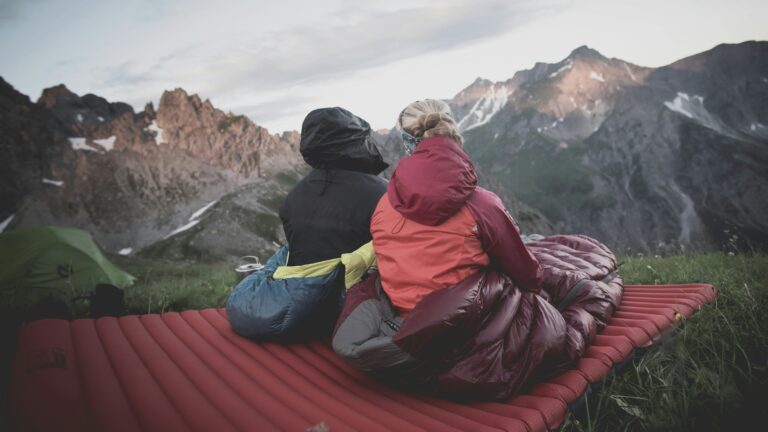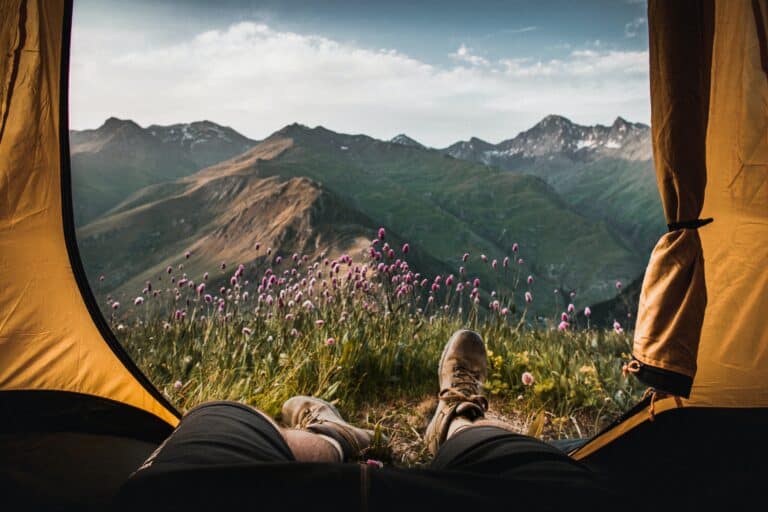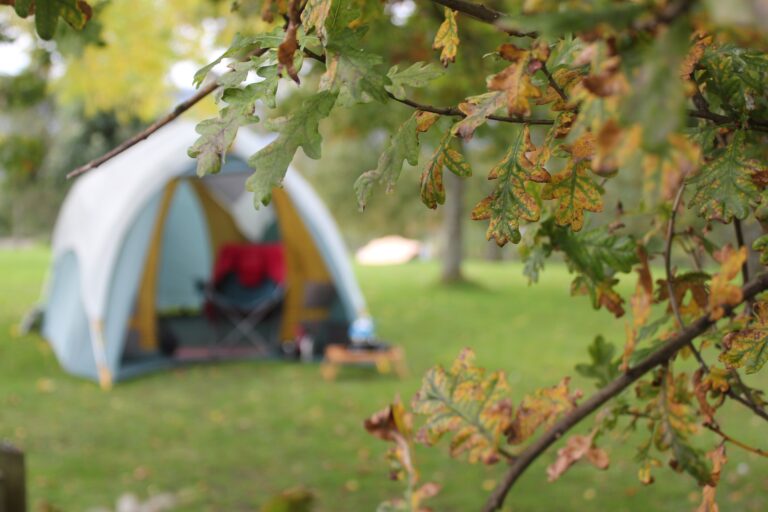Smart Camping for Beginners: Essential AI Gadgets for 2025
Are you searching for a smart camping for beginners guide? Read our latest blog to find out all you need to know to get started on your smart camping journey.

Last Updated on 3 May 2025
Imagine waking up, checking the weather on your smartphone, and brewing coffee with a portable electric kettle—all powered by yesterday’s sunshine through your solar camping equipment! Smart camping has changed outdoor experiences, making wilderness adventures more accessible and comfortable for beginners.
According to 2025 data from Condor Ferries, 97% of campers bring some form of technology with them during their trips. The anxiety that often comes with first-time camping can be significantly reduced with the right technology by your side. From camping apps for beginners to water purification devices, today’s smart camping gear provides convenience without sacrificing the authentic outdoor experience.
Let’s explore how smart camping for beginners can enhance your camping adventure while still allowing you to disconnect and appreciate nature!

Read more: Best AI Camping Gear for 2025: The Complete Guide
Read more: 7 Best AI Camping Gadgets: The Ultimate Buyer’s Guide in 2025
Read more: AI Camping Navigation: The Best Guide You Need in 2025
What is Smart Camping?
I remember my first camping trip about 15 years ago. Armed with nothing but a basic tent, sleeping bag, and an ancient map that had seen better days, I found myself lost in the Lake District as darkness fell. The rain started hammering down, my phone had died hours earlier, and I genuinely wondered if I’d made a terrible mistake.
Fast forward to last summer, and what a difference! I used GPS devices for hiking to track our entire route, recharged gadgets using a compact solar panel, and even checked weather alerts on my smartwatch before deciding to pack up early—avoiding the massive thunderstorm that rolled in just as we reached the car park. That, my friends, is the essence of smart camping.
Smart camping is essentially the thoughtful marriage of traditional outdoor experiences with modern technology. It’s about enhancing—not replacing—the wilderness experience by incorporating tech that makes camping safer, more convenient, and accessible to more people.

The evolution has been fascinating to watch. We’ve gone from basic tools and guesswork to integrated tech solutions that genuinely improve the camping experience. Solar panels that fold into your backpack, water purifiers, and GPS camping tools that you can rely on when you need them in an emergency.
Read more: AI Camping Apps in 2025: The Best Info is All Here to Read
Read more: The 7 Best AI Camping Watches Available Now in 2025
Read more: A Complete Guide to Smart Camping Devices to Use in 2025
Essential Smart Camping Gear for Beginners
When I first started camping properly, I made the mistake of bringing loads of unnecessary kit while forgetting the genuinely useful stuff. These days, I’ve got my tech camping essentials sorted, and I’m always helping friends who are just getting started. Smart camping for beginners doesn’t have to break the bank, but investing in a few key pieces can transform your outdoor adventures.
Here’s what I consider essential smart camping for beginners based on years of trial and error (and yes, plenty of errors).
Portable Power Solutions
If there’s one thing that’s revolutionised my camping experience, it’s reliable portable power. On a recent trip to the Scottish Highlands, having power backup meant I could keep my phone charged for emergency navigation when fog rolled in unexpectedly.
The Goal Zero Yeti 200X power station (around £230) is a bit of an investment when it comes to portable power stations for camping, but it’s brilliant for weekend trips when you need to charge multiple devices. It’s surprisingly compact for the power it delivers, though admittedly a bit heavy for backpacking.

The BioLite CampStove 2+ (approximately £135) is another game-changer that serves double duty. It burns twigs and small bits of wood to cook your meals while generating electricity to charge your devices. Brilliant concept, though it does require constant feeding with small sticks, which some may not like when you’re trying to relax.
Smart Lighting Solutions
Proper lighting makes such a difference to campsite comfort and safety. I used to think my phone torch was enough until I tried cooking dinner with it clenched between my teeth!
My Mpowerd Luci Pro Outdoor 2.0 solar lantern (roughly £37) has been amazing. It’s inflatable, waterproof, and provides up to 50 hours of light on a single charge. The built-in battery indicator is brilliant for knowing when you need to place it in the sun. This is a great eco-friendly camping technology device I think all campers should have.

For personal lighting, I wouldn’t be without my Black Diamond Spot 400 headlamp (about £55). Hands-free light is essential for everything from night-time loo trips to reading in your tent. The red light mode preserves your night vision and doesn’t attract as many insects.
Water Purification Technology
Clean water is non-negotiable, and smart water purification makes this easier than ever. I’ve had my share of dodgy tummy issues from questionable water sources, so I don’t mess about with this anymore.
The humble LifeStraw (about £44) is brilliant for emergencies. It’s lightweight, requires no batteries, and filters out 99.9% of waterborne bacteria. I always keep one in my pack just in case.
For daily use, my LARQ self-purifying water bottle (about £89) uses UV-C LED technology to purify water and keep the bottle clean. It’s a bit expensive, but it’s been worth every penny for peace of mind.

The Grayl Geopress water purifier (roughly £100) is what I recommend to most beginners. It works like a French press—you fill it, press down, and in about 15 seconds, you have clean water. It filters out viruses, bacteria, protozoa, and even microplastics and heavy metals. Brilliant for dubious water sources!
Navigation Tools
Getting lost is scary, and it’s happened to me more times than I’d care to admit. Smart navigation tools have saved me on multiple occasions.
The Garmin eTrex 22x GPS (around £170) is a solid, reliable GPS device that works even when you have no phone signal. The battery life is impressive—about 25 hours on two AA batteries—and it’s built tough enough to survive being dropped (I’ve tested this unintentionally several times).

If you’re venturing into truly remote areas, consider a satellite messenger like the Spot X (approximately £307). It allows two-way text messaging and has an SOS button for emergencies. The peace of mind is worth the cost if you’re camping far from civilisation.
Read more: The Best Guide to AI Camping Weather Prediction Tools in 2025
Read more: 7 Best Affordable AI Camping Gadgets to Buy in 2025
Smart Camping for Beginners: Apps and Digital Resources
I’ll be the first to admit that I was once a stubborn traditionalist when it came to camping. “No phones in nature!” I’d declare whilst waving around my tattered paper maps. That attitude lasted right up until I got lost in the Peak District with rapidly fading daylight and no clue which footpath led back to the campsite.
Navigation Apps
Having reliable navigation is arguably the most important aspect of safe camping, and modern apps have revolutionised how we find our way in the wilderness.
AllTrails has become my go-to hiking companion over the past few years. The free version is decent enough, but AllTrails Pro (about £36/year) is worth every penny for the offline map downloads alone. I’ve discovered some absolute gems of hiking routes that I’d never have found otherwise.

Gaia GPS offers more detailed topographic maps and is brilliant for more serious backcountry adventures where digital navigation for hiking is needed. I relied heavily on it during a week-long hike through Snowdonia last summer. The ability to download satellite imagery beforehand meant I could identify potential camping spots near water sources before I’d even left home.
Either of these are great when picking the best smart camping for beginners tools.
Read more: AI vs GPS Camping Navigation: What’s Top of the Class in 2025?
Read more: AI Camping Safety Tools: Here’s What You Need in 2025
Safety and Security Smart Camping for Beginners
I’ll never forget that sinking feeling when my friend slipped on a moss-covered rock and twisted his ankle badly during our hike in the Lake District. We were a good seven miles from the nearest road, with patchy mobile reception at best. That day taught me a valuable lesson about emergency preparedness that I’ve carried with me ever since.
Camping safety technology has absolutely transformed wilderness adventures, making remote camping safer and more accessible. While I’ve always loved the feeling of “getting away from it all,” I’ve learned through experience (sometimes the hard way) that being properly equipped for emergencies is being sensible. It should definitely form part of your tech camping essentials list.
Communication Devices
When you’re truly off-grid, reliable communication can literally be a lifesaver. After that incident in the Lake District, I invested in a Garmin inReach Mini 2 (about £290). This palm-sized satellite communicator lets you send text messages, share your location, and trigger SOS alerts from virtually anywhere—even places with zero mobile coverage. During a remote wild camping trip in Scotland last autumn, I was able to message my family daily to confirm I was safe despite being completely out of mobile range for five days.

The Spot X satellite messenger (approximately £307) offers similar functionality at a slightly higher price point. A camping buddy uses one regularly and particularly likes the physical keyboard for easier messaging. The battery life is impressive—her device lasted nearly two weeks on a single charge during our Pembrokeshire coastal trek.
Health Monitoring
Smart wearables have transformed how we monitor personal health and safety outdoors. My Garmin Instinct 2 Solar (approximately £300) has been worth every penny for camping trips. Beyond basic step counting, it provides detailed GPS tracking, weather alerts, and health metrics like heart rate and sleep quality. The solar charging capability means it rarely runs out of power during multi-day adventures, and the breadcrumb feature has helped me navigate back to camp more times than I care to admit.

The Apple Watch Ultra 2 (from £799) is another brilliant option if you’re in the Apple ecosystem. A climbing friend swears by its accurate altimeter readings and crash detection feature, which automatically calls emergency services if it detects a severe fall. The emergency siren function can help rescuers locate you in poor visibility conditions—something he actually needed once when fog descended rapidly during a mountain hike.
Read more: 5 Cutting-Edge AI Camping Safety Devices to Use in 2025
Read more: Solar AI Camping Devices: What Should You Own in 2025?
Final Thoughts on Smart Camping for Beginners
Smart camping for beginners provides the perfect bridge for those starting out with smartphone camping applications to step confidently into outdoor adventures while maintaining connection to helpful technology.
With thoughtful preparation and the right gear—from digital mapping for beginners to water-resistant camping gear and solar cooking equipment—you can create a camping experience that balances modern convenience with natural immersion.
Remember that smart camping for beginners and those more advanced should find that it enhances rather than replaces your connection with the outdoors. Use these off-grid communication devices to overcome initial challenges, build confidence, and gradually develop your outdoor skills. As you become more experienced, you may find yourself relying less on certain technologies while appreciating others even more.
The smartest approach to camping isn’t about having the most gear—it’s about using the right tools to create memorable experiences while staying safe and comfortable in nature. So charge those devices, download those maps, and head out to discover the joys of smart camping in 2025!
What do you think of smart camping for beginners? Will you be using any of these tools on your next adventure?
Happy travels!







Great ideas! Definitely saving this for later!
Thank you!
As a noobie camper, I’ve never even heard of these. The gps that works without phone signal is kind of a genius. I would hate to be lost too haha. Thanks for these.
I hate getting lost too, ha! I hope these help you!